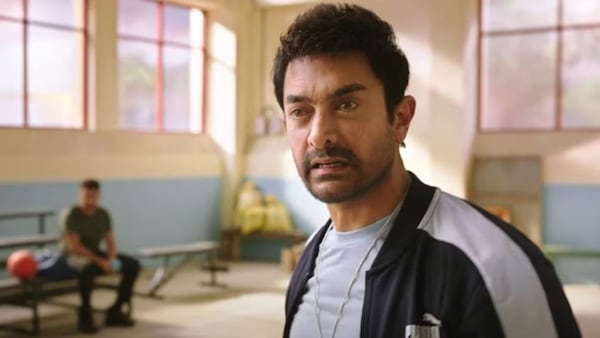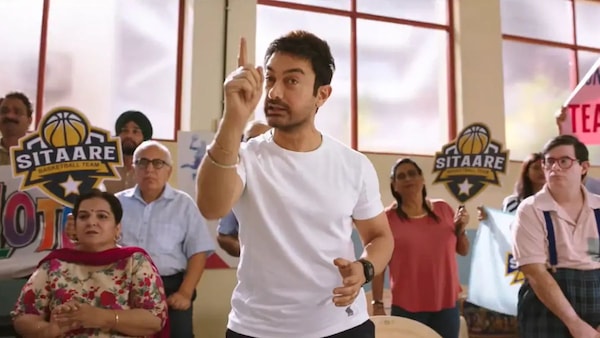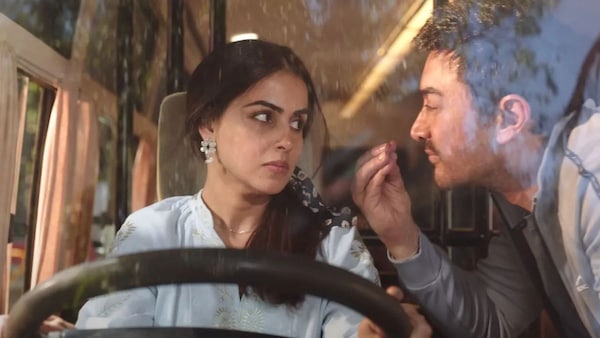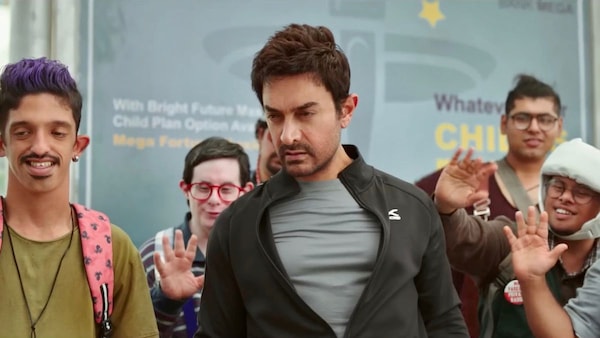Sitaare Zameen Par: An Overeager Aamir Khan Is Not Good News
Much like Khan’s performance, where if looked closely one can notice a thought arriving at his brain, RS Prasanna’s film is dunked in bluntness. Everything is text, even the subtext.

Promo poster for Sitaare Zameen Par.
Last Updated: 01.32 PM, Jun 21, 2025
IF AAMIR KHAN'S Sitaare Zameen Par were a person, they would err on the side of excess. They would be “too” quick to commit mistakes and “too” eager to rectify. They would be “too” prone to misacting and later be “too” contrite. If Sitaare Zameen Par were a person, they would resemble Khan’s on-screen persona, most of which is built on a saviour complex and dishing out wisdom to unsuspecting adults. Except, he switches sides this time — for once, the actor wants to be taught.
This is common. Khan hosted and produced the relevant Satyamev Jayate, a show dedicated to spotlighting pressing social issues; all episodes consisted of him sitting amidst experts and being struck by one revelation after another. This enthusiasm to learn, coupled with the actor’s recent propensity of making every act act distils his turn in Sitaare Zameen Par — a film that badly wants your tears.

It is not an unreasonable want. Sitaare is the spiritual sequel of Taare Zameen Par (2007), Khan’s directorial debut that can function as a synonym of a sob-fest. Two decades ago, he played a perceptive teacher who recognised a dyslexic child’s struggle even when his parents failed to do so. This time, he plays an impolite basketball coach entrusted with the task of teaching the sport to a group of specially-abled people. Although adapted from the 2018 Spanish film Champions, there is a neatness to the circle, an authenticity to the premise of a teacher wanting to be taught.
But there is a sea of difference between the performances, even when the intent remains the same. If Khan was pathbreaking in calling out the insensitivity in others, he is cloying when portraying the same thoughtlessness. His portrayal of an insecure athlete thrown into the mix of people he is prone to make fun of is superfluous at best, even when sincere. His pitch is perpetually dialled up, reminiscent of the sole misfire in Laal Singh Chaddha (2002), and at odds with the unaffected renditions of the rest. The film mimics the tonality.

He is Gulshan Arora, a difficult Delhi man on all fronts. He lives with his mother (the wonderful Dolly Ahluwalia; seven years older than Khan) after a spat with his wife, Suneeta (Genelia D'Souza). He is also freshly suspended after landing a punch on the senior coach when taunted about his height. One thing leads to another, and a drunken accident later, Gulshan finds himself in court, fearing punishment. Instead, he is put into community service and his role involves training a group of 10 specially abled people— Guddu, Satbir, Bantu, Hargovind, Lotus, Raju, Kareem, Sunil, Golu and Sharmaji — in a school of sorts, run by a Kartar Paaji (Gurpal Singh). The route from here is clear if familiar. Despite being the coach, it is Gulshan who stands to (un)learn.

Directed by RS Prasanna, Sitaare Zameen Par goes through the hoops by dispensing lessons at every turn. Khan might be in the classroom, but we are all students. Gulshan’s interactions with the affable Kartar Paaji involve the same arc – Gulshan says something heedless (often sprouting “paagal” when referring to the students) and Singh’s character gently corrects him. No one is abnormal because each has their own sense of normal.
It is a noble thought, and a necessary one. But Sitaare Zameen Par does not arrive at it as much as goads us to arrive at it. Much like Khan’s performance, where if looked closely one can notice a thought arriving at his brain, Prasanna’s film is dunked in bluntness. Everything is text, even the subtext. Gulshan’s curiosity is rudimentary — “What happened to them?” — and so are the responses. He is always learning from everyone. His mother encourages him to stand up for the team, his wife persuades him to keep at the job, and Gulshan does so. This message-over-storytelling emphasis expands as the film unfolds. In one scene, an overwhelmed Gulshan tells his wife, “I am not their coach, they are my coach”.

But Khan obviously wants to teach. The actor’s pedantic stance overwhelms the film and dampens the filmmaking. Prasanna, who previously helmed Shubh Mangal Saavdhan (2017), is reduced to an onlooker to Khan’s theatrics. Most of the scenes take place in closed spaces, featuring a clueless Gulshan learning about the brave old world. And by doing so, Sitaare Zameen Par comes dangerously close to talking down on those it wishes to uphold.
